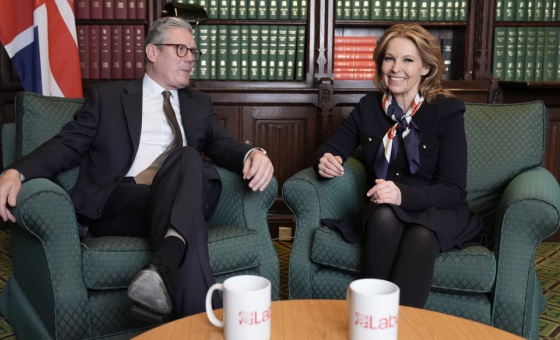This is the last article you can read this month
You can read more article this month
You can read more articles this month
Sorry your limit is up for this month
Reset on:
Please help support the Morning Star by subscribing here
WAR in Gaza, war in Yemen, war in Ukraine and sharply increased arms spending is the policy of the British state, Prime Minister Rishi Sunak made clear in the Commons today.
The PM defended the bombing of Yemen by the Royal Navy last week as essential to preserving freedom of maritime navigation and accused the Houthis of “the biggest attack on the Royal Navy for decades.”
Straining credulity, Mr Sunak insisted that this latest Anglo-US aggression in the region had “nothing to do with what is going on in Israel and Gaza” and that it was a “malign narrative” to suggest otherwise.
The issues were, he claimed, “entirely distinct” — a fiction that Labour leader Sir Keir Starmer seemed entirely happy to go along with.
Making a bizarre distinction, Mr Sunak at one point even denied that Yemen had been bombed, insisting that only the Houthis were targeted.
MPs for the most part endorsed the government’s aggressive actions in the Red Sea, just as they previously failed to call for a Gaza ceasefire.
However, this narrative was challenged by a number of left MPs.
Zarah Sultana was forthright, telling the Commons that what was “driving instability was Israel’s horrifying assault on Gaza,” demanding that the government get behind an immediate ceasefire.
Jeremy Corbyn slammed the bombing of Yemen with British-supplied bombs over recent years, and urged that the government to bring forward a comprehensive plan for peace in the region rather than simply pouring in weaponry.
Apsana Begum accused the government of a military “escalation of the situation in the Red Sea” while reminding him that 71 per cent of the British public wanted a ceasefire in Gaza, and Mick Whitley warned that acting without international authorisation exposed Britain to greater risk of terrorism.
John McDonnell emphasised that “the longer the Gaza war goes on, the greater the instability in the Middle East,” while Green MP Caroline Lucas said people in the region believed Britain was intervening on the side of Israel.
Even Tory MP Edward Leigh struck a concerned note, stressing that justice for the Palestinian people was vital.
Writing earlier on X, formerly Twitter, Diane Abbott flatly opposed further British military intervention in the region.
“Every time it has ended in death, destruction and disaster. Supporters of bombing Yemen show they have learned nothing,” she wrote.
Mr Sunak was more concerned about “containers and tankers are having to take a 5,000 mile detour around the Cape of Good Hope” as a result of the conflict in the Red Sea, pushing up prices and reducing consumers’ access to goods.
He was also anxious to tie in Britain’s actions in the Gulf with its continuing promotion of the war in Ukraine.
Reporting on his visit to Kyiv on Friday in the same Commons statement, he boasted that Britain was supplying the “largest package of advanced drones given by any nation” and had spent £12 billion in aid to Ukraine since the war began.
The PM further reaffirmed an aim to raise military spending to 2.5 per cent of GDP, while Defence Secretary Grant Shapps said earlier that he would like to see it reach three per cent, a 50 per cent increase from present sums.
Sir Keir joined Mr Sunak in pledging support for Ukraine was “for as long as it takes,” while the Liberal Democrats backed both the Tories and Labour over Yemen.
Stop the War Coalition convener Lindsey German commented today: "The British and US governments are in a tiny minority across the world in refusing to call for a ceasefire, a position backed by Keir Starmer’s official ‘opposition’, which also predictably supports the bombing of Yemen."











